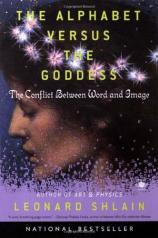Reading Group Guide
Discussion Questions
The Alphabet Versus the Goddess

1.Throughout the book Shlain emphasizes the dualities inherent in the experience of living—life/death, yin/yang, reason/madness. Why do you think it is important to recognize these dualities? Can you think of examples in your own life in which opposing forces work together to create both negative and positive change?
2. Shlain uses the example of Christ's teachings to illustrate the difference between the spoken word and the written word. Communication, he argues, changes when it is written. What sorts of changes is he talking about? How do you think the ideas exchanged in your own group would be altered if they were written down?
3. In his history of human civilization, Shlain recounts centuries of cruel and violent behavior carried out in behalf of religion and ethnic purity. In each case, he cites a literacy-related cause for such behavior. Using his thesis, is it possible to find similar root causes for such atrocities as the tribal massacres in Rwanda, the ethnic cleansing in Yugoslavia, or shootings in America's schools? A century from now, how do you think historians and anthropologists will explain these incidents?
4. Shlain is optimistic for the future of mankind and is convinced that we are returning to right-hemisphere-type values that point to a more peaceful future. Do you agree or disagree with him?
5. Shlain cites a number of male figures—including Moses, Christ, Plato, Augustine, Luther, Calvin, Hitler, Einstein, and Freud—who made important and lasting (but not always beneficial) contributions to civilization. What makes their contributions so significant? How were they or their actions affected by the written word? Can you add any living people—any women—who might be added to that list?
6. Chances are, you have a television and a telephone in your home. Discuss the role these technologies play in your lives, especially with regard to communication. Likewise, how do you think computers are affecting current generations of young people? Are the impacts mostly positive or negative?
7. Discuss the right-brain/left-brain theory and explain which sides each of you favor. Then discuss how the results break down by gender in your group.
8. Shlain points to the invention of the printing press as the cause for much of the excessive behavior of the sixteenth century. Is the Internet our century's printing press? Give examples in which the Internet has played an important role, whether negative or positive, in shaping recent events.
9."In the age of the image," writes Shlain, "literacy will inevitably decline." Even if this development does not lead to a decline in our overall intelligence, what concerns does it raise? Imagine if your children's school decided that learning to perceive and create images took precedence over reading skills. Is there a prejudice against imagery in our society? If so, is it a valid prejudice?
10. After reading The Alphabet Versus the Goddess, do you agree with Shlain's thesis?
The Alphabet Versus the Goddess
- Publication Date: September 1, 1999
- Paperback: 496 pages
- Publisher: Penguin (Non-Classics)
- ISBN-10: 0140196013
- ISBN-13: 9780140196016






